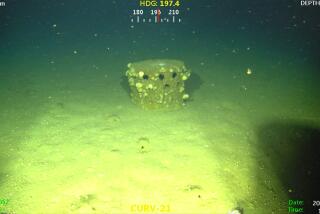Argentina Uncovers Vast Secret Arsenals in Series of Raids
- Share via
BUENOS AIRES — In a series of raids this month, Argentine authorities have discovered clandestine arsenals containing hundreds of tons of bullets, artillery shells and other ammunition.
The judge handling the case has assured the public that it appears to be merely a matter of corruption and not part of a plot by right-wing extremists to undo the democratic government. The ammunition, along with miles of stolen public telephone wire, apparently was to be melted down for its copper.
Still, the magnitude of the finds and the purported political ties of some of the suspects have caused considerable disquiet here--not to mention anger among those without telephone service because of the cable thefts.
Raids Began in November
Buenos Aires Federal Court Judge Alberto Piotti began ordering raids in early November, and confessions by suspects made possible subsequent and more spectacular seizures in a dozen warehouses, homes and factories around the capital.
In suburban Lanus, police spent the week searching for more hidden rooms in a metal foundry where an estimated 200 tons of shells were found, many of them spent but some still usable. The material filled dozens of 55-gallon drums.
Piotti concluded that it would be impossible to count all the ammunition and decided instead to measure it by the ton.
Investigators also found two bones believed to be from a human body, prompting unconfirmed speculation of links to past unsolved kidnapings.
Piotti ordered the arrest of an Army lieutenant colonel, Guillermo Janza, and questioned him in secret. Janza, who serves at a munitions depot, has denied involvement in procuring the material. The judge also issued an arrest warrant for Ricardo Marchessi, a scrap metal dealer and owner of several warehouses where arsenals were found. Marchessi, described as the mastermind, is believed to have fled to neighboring Paraguay.
Responding to press speculation that the arms may have been stolen to outfit right-wing extremists, either civilian or military, Piotti told reporters that the case involved “a crime of an economic nature.”
“The ideological aspect must be completely ruled out,” he said.
Piotti acknowledged that some weapons might have been sold abroad illegally but said the majority appeared to be headed for Marchessi’s scrap metal operation.
The army issued a statement denying published reports that Marchessi had served as a civilian intelligence agent during the early years of the military dictatorship from 1976 to 1983.
The Buenos Aires Herald said that even if there were no political motives, the discovery of such vast stores of military ammunition in private hands was a cause for worry. “The greatest menace posed by such munitions hoards is the suggestion of private armies--societies which are armed to the teeth face the imminent prospect of civil war or guerrilla insurrection,” the paper said.
Links to Rebels
The weekly news magazine Somos said that Marchessi had indirect links with those involved in failed army uprisings in April, 1987, and last January against President Raul Alfonsin’s government.
The discoveries apparently unsettled others who had arms caches of their own. Midweek, police found 10,000 bullets recently abandoned in a field and located another 3,500 rounds of automatic rifle ammunition dumped in a sewer.
Telephone company crews were recovering from the warehouses vast amounts of cable that also had been intended for meltdown. Somos said the material had been stolen from installations in four suburbs, leaving 75,000 people without phone service.
In one of the warehouses, the magazine noted, “the thieves had even burned some stolen fiber optic cable, absurdly searching for copper that was not present.”
Alejandro Guillot, Piotti’s chief aide, said he expects more seizures in coming days. He said it was impossible to give a precise estimate of the quantity impounded so far.
Dante Caridi, commander of the army, said Friday that the army was resolved “to support firmly the actions that civil justice might require in its investigations (of the arsenals), whether or not they involve military personal.”
In a speech to army officers emphasizing the military’s commitment to democracy and to an orderly transition from Alfonsin to his elected successor next year, Caridi declared that no one in the military had impunity and that military courts would stay out of the arms case.
More to Read
Sign up for Essential California
The most important California stories and recommendations in your inbox every morning.
You may occasionally receive promotional content from the Los Angeles Times.










